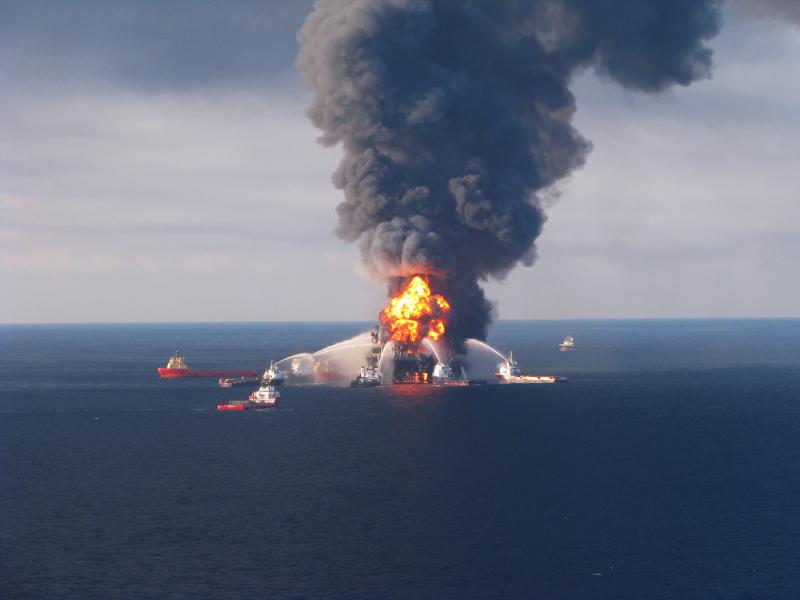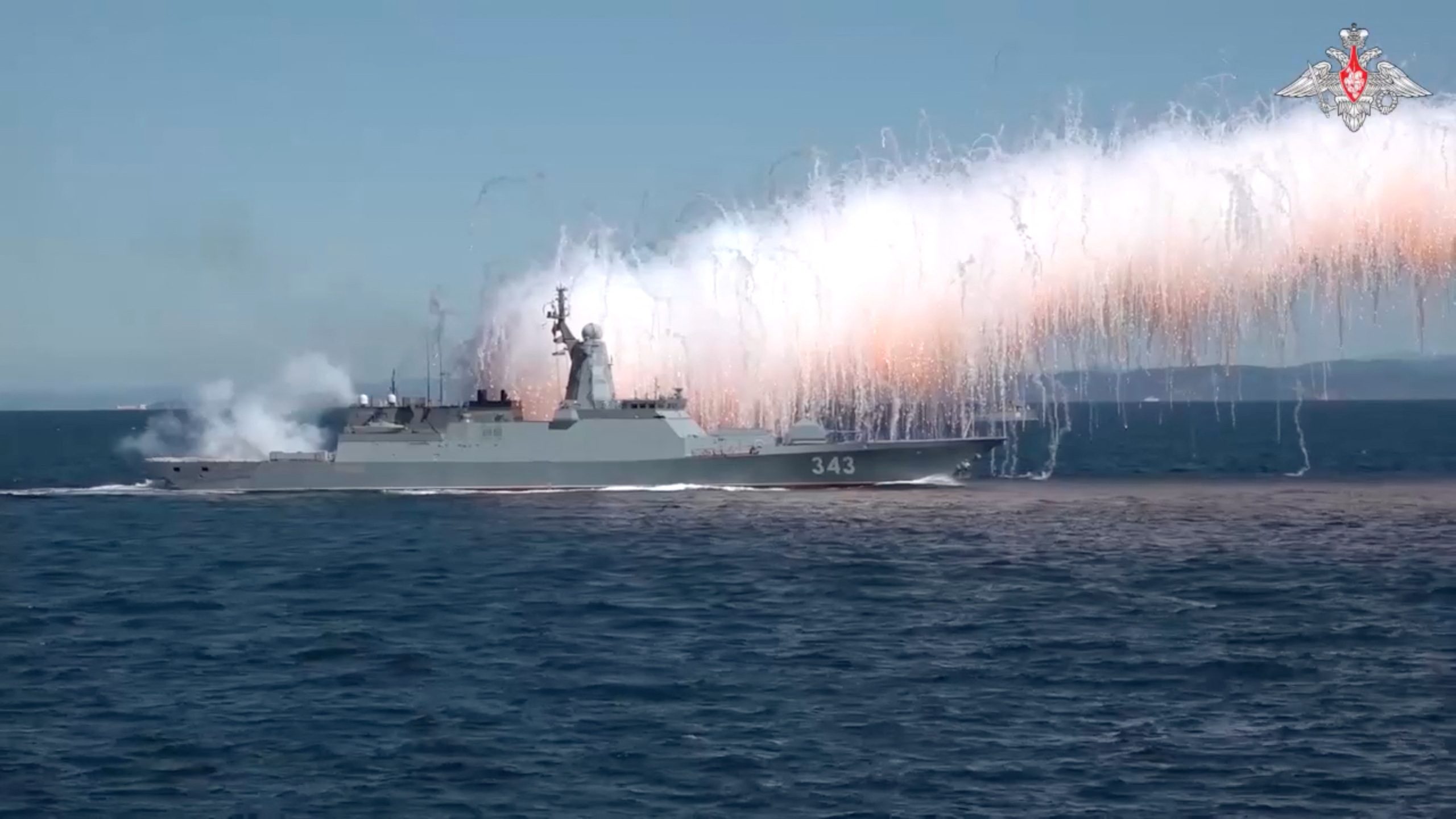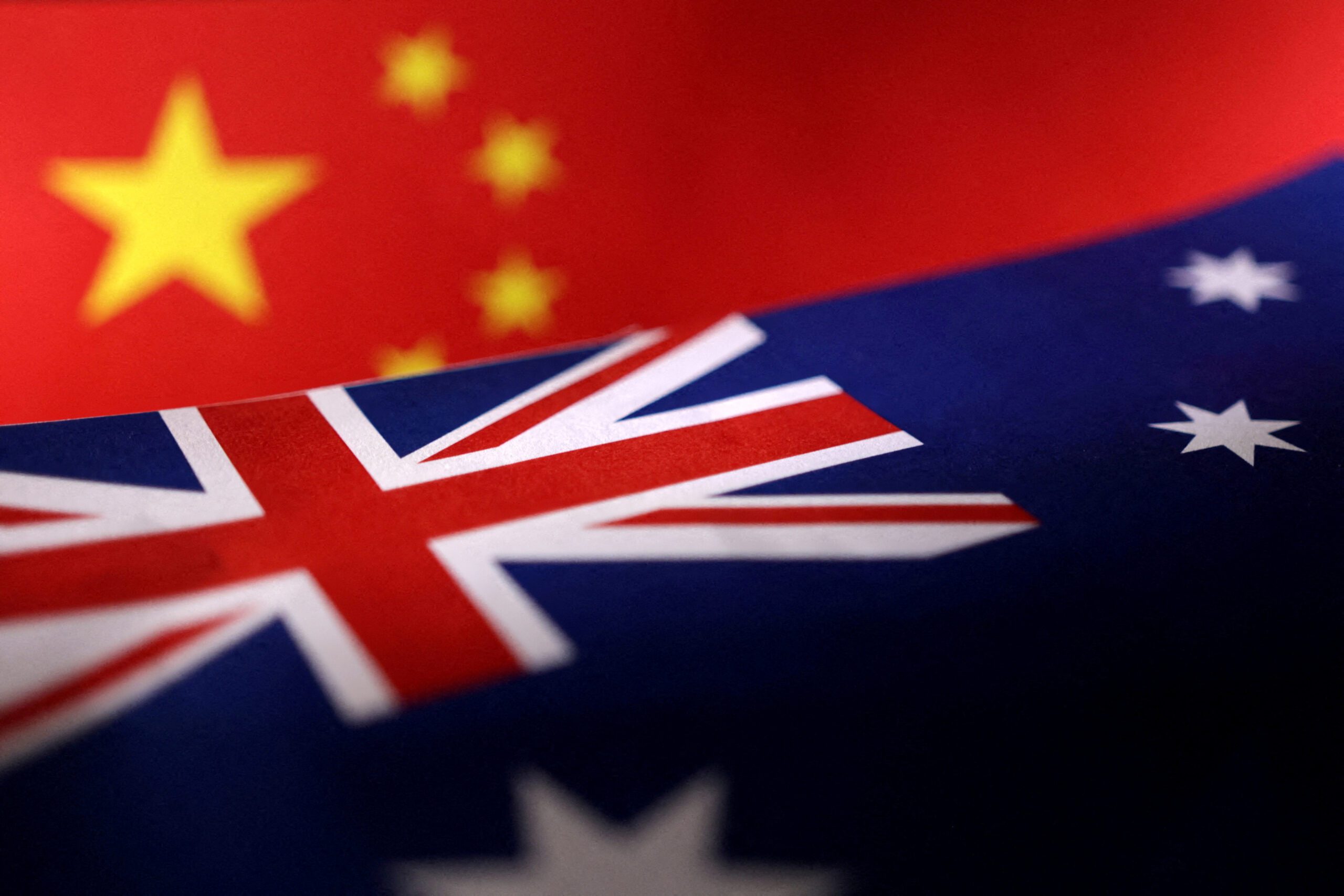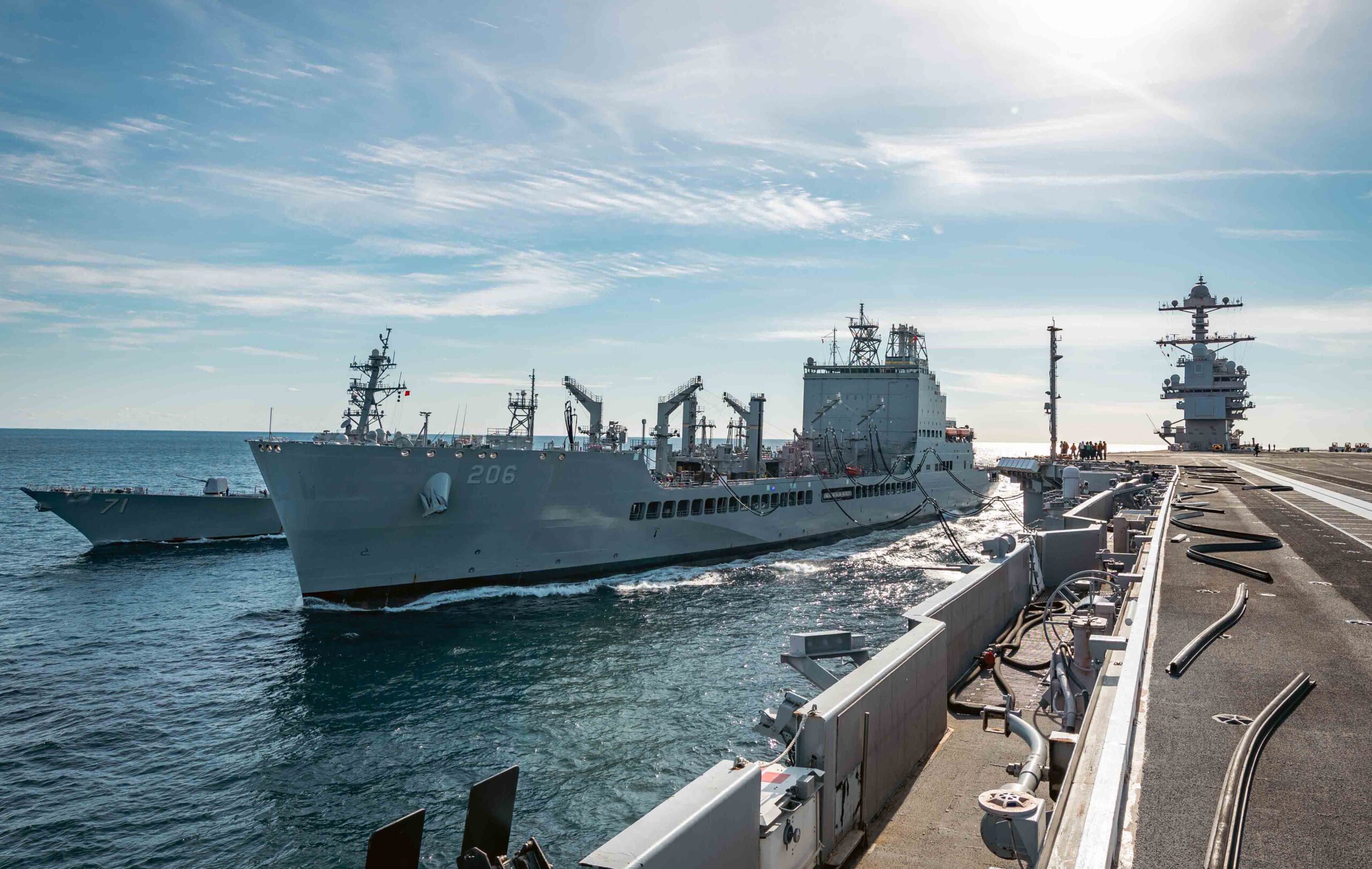
Today, The National Commission on the BP Deepwater Horizon Oil Spill and Offshore Drilling release its final report on its investigation into the Deepwater Horizon Oil spill.
The Commission was established on May 22 by President Obama to examine the relevant facts and circumstances concerning the root causes of the Deepwater Horizon explosion and develope options to guard against, and mitigate the impact of, any oil spills associated with offshore drilling in the future. The Commission is co-chaired by Senator Bob Graham and former EPA Administrator William K. Reilly, and includes other members including Frances Beinecke, Donald Boesch, Terry Garcia, Cherry Murray, and Frances Ulmer.
The report, DEEPWATER; The Gulf Oil Disaster and the Future of Offshore Drilling can be downloaded in its entirety HERE.
Below is a summary of the reports key findings provided by www.oilspillcommission.gov:
Oil Spill Commission Landmark Report on Gulf Disaster Proposes Urgent Reform of Industry and Government Practices to Overhaul U.S. Offshore Drilling Safety
Definitive Investigation Finds Gulf Disaster was Preventable; Similar Future Disasters Likely Without Action by Congress, Administration, and Industry
Growing U.S. Dependence on Domestic Offshore Oil Makes Reform a National Priority; Independent Government Safety Agency and Industry Safety Institute Both Needed
(Washington, DC) – The Presidentially-appointed Oil Spill Commission today released its landmark, definitive report, Deep Water: The Gulf Oil Disaster and the Future of Offshore Drilling, on the causes and consequences of the BP Deepwater Horizon disaster, and proposed comprehensive reforms of both government and industry practices to overhaul the U.S. approach to drilling safety and greatly reduce the chances of a similar, large scale disaster in the future.
“Our investigation shows that a series of specific and preventable human and engineering failures were the immediate causes of the disaster,” said Commission Co- Chair William K. Reilly. “But, in fact, this disaster was almost the inevitable result of years of industry and government complacency and lack of attention to safety. This was indisputably the case with BP, Transocean, and Halliburton, as well as the government agency charged with regulating offshore drilling—the former Minerals Management Service. As drilling pushes into ever deeper and riskier waters where more of America’s oil lies, only systemic reforms of both government and industry will prevent a similar, future disaster.”
“The reforms needed to prevent future disasters are spelled out today in black and white,” said Commission Co-Chair Bob Graham. “Specific actions must be taken by Congress, by the Administration, and by industry to reduce the likelihood of a similar tragedy. If they are not taken, the probability of another failure will be dramatically greater. The people of the Gulf who have suffered so much deserve to know what their government and the industry are going to do.”
“The oil and gas industry must realize that accidents by any company will limit opportunities for production by every company.” Reilly said. “Like it or not, oil and gas companies are in this together, and they must adopt rigorous standards through an industry-wide Safety Institute, or risk losing access to these leases and resulting profits.”
“The government must establish an independent agency responsible for regulating all aspects of offshore drilling safety to make the U.S. the international leader on this issue,” said Graham. “Only a truly independent federal safety agency—totally separated from leasing practices and politics—can provide certainty that the regulators do not again become captive to the industry. We learned that our country does not have the safest record or the highest safety standards when compared to other countries. We believe that must change to restore confidence in future oil and gas operations. The U.S. must become the global leader in safety, and the reforms we propose, if acted on by Congress and the Administration, will do just that.”
“These reforms are a national priority, and must be treated as such by the Administration, the Congress, and the industry,” said Reilly. “This is not the time to be timid or incremental,” said Graham. “Now is the time to be bold and take decisive action to dramatically reduce the likelihood of these inherently risky activities conducted on property that belongs to the people of the United States, possibly resulting in another Deepwater Horizon disaster.”
KEY COMMISSION FINDINGS
SUMMARY: The Commission found that the Deepwater Horizon disaster was foreseeable and preventable. Errors and misjudgments by three major oil drilling companies—BP, Halliburton, and Transocean—played key roles in the disaster. Government regulation was ineffective, and failed to keep pace with technology advancements in offshore drilling.
1. The Macondo well blowout was the product of human error, engineering mistakes, and management failures, including the following: Failure adequately to evaluate and manage risk in late-stage well-design decisions.
- Failure to redesign cement slurry in response to tests that repeatedly demonstrated problems with the slurry design.
- Failure to recognize that the critical “negative pressure test”—a key test used to determine the integrity of the cement job that seals off the well—signaled that the cement at the well-bottom had failed to seal off hydrocarbons.
- Failure to recognize that the temporary well-abandonment procedures, which BP changed repeatedly in the days leading up to the blowout, unnecessarily increased the risk of a well blowout.
- Failure to recognize and respond to early warning signals of the hydrocarbon influx (or “kick”) that eventually became the blowout.
- Failure to respond appropriately to the blowout once it began, including but not limited to the failure of the rig’s blowout preventer to shut in the well.
2. These errors, mistakes, and management failures were not the product of a single, rogue company, but instead reveal both failures and inadequate safety procedures by three key industry players that have a large presence in offshore oil and gas drilling throughout the world.
3. Government oversight failed to reduce the risks of such a well blowout.
- Oversight was compromised by commingling two distinct missions within one agency: 1) responsibility for promoting the rapid expansion of offshore leasing and drilling; and 2) responsibility for ensuring its safety.
- Regulation failed to keep pace with the dramatic transformation of the offshore drilling industry and the move to deepwater drilling. Neither inspectors on the front lines nor senior Interior Department officials in charge of the Minerals Management Service (MMS) had the experience or training to oversee deepwater offshore drilling.
- The Department of the Interior lacked sufficient in-house expertise to enforce existing regulations, and was unable to impose more stringent safety regulations due in large part to industry resistance.
4. The Minerals Management Service did not receive predictable and adequate funding needed to effectively oversee offshore drilling.
- Over the past twenty years, the MMS budget for leasing, environmental protection, and regulatory oversight decreased or remained relatively static while deepwater drilling in the Gulf of Mexico expanded dramatically.
5. Both industry and government were unprepared to contain a deepwater well blowout.
- At the time of the Macondo well blowout on April 20, 2010, the federal government was unprepared to oversee a deepwater well-containment effort.
- At the time of the blowout, BP—and industry more generally—had no proven options for rapid containment in deepwater other than attempting to close the blowout preventer.
- The underestimates of the amount of oil spilling from the Macondo well appear to have impeded planning for and analysis of well-containment efforts and contributed to a loss of confidence on the part of the public in the competence of the federal government.
- The Deepwater Horizon’s blowout preventer lacked key diagnostic tools that would have assisted in the containment effort.
6. Both industry and government were unprepared to respond to a massive deepwater oil spill, even though such a spill was foreseeable.
- Companies did not possess the response capabilities they claimed.
- Since the Exxon Valdez oil spill in 1989, neither industry nor the government has made significant investments in spill-response research and development, so the clean-up technology used following the Deepwater Horizon spill was largely unchanged.
7. The environmental damage of the spill to the Gulf will take decades to fully assess. The government estimates that more than 170 million gallons of oil went into the Gulf, with some portion remaining in the ocean and possibly settling to the sea floor. The Macondo disaster placed further stress on coastal resources already degraded over many decades by a variety of economic and development activities, including energy production.
8. As bad as the Deepwater Horizon disaster was, it could have been much worse. At one point, industry experts feared that a significant portion of the 4.6 billion gallon oil and gas reservoir beneath the sea floor could be released into the Gulf.
9. The economic impact on Gulf residents was severe. Especially hard hit were the seafood and tourism industries. Health-related impacts, both physical and mental, have been evident and are still being examined.
10. The Arctic is an important area for future oil and gas development, based on projections of significant resources and industry interest. In order to assure good decisions are made regarding where, when, and how to develop those resources safely and reduce risk in frontier areas, additional comprehensive scientific, technical, and oil spill response research is needed.
11. Offshore drilling in nations adjacent to the U.S. is likely to accelerate. The U.S. and other countries, in partnership with multinational energy companies, need to ensure that the highest standards for drilling safety and environmental performance are adopted worldwide. This is increasingly urgent both in the Arctic and in the Gulf, where Mexico and Cuba plan to pursue deepwater drilling in the near future.
“Our exhaustive investigation finds that none of the major aspects of offshore drilling safety—not the regulatory oversight, not the industry safety standards, not the spill response practices—kept pace with the push into deepwater. In effect, our nation was entirely unprepared for an inevitable disaster,” said Reilly. “Perhaps the only greater tragedy would be not implementing the reforms we recommend based on this disaster, and allowing another, similar disaster to occur.”
“But our message is essentially a hopeful one. It is in everybody’s interest to get this right—the government’s to step up its oversight, industry to raise the bar of performance for any laggards, and the Congress to ensure the protection of the Gulf and its people,” Reilly added.
“The future of offshore drilling must be in the context of a national energy policy,” said Graham. “That policy must take into account the amount of remaining proven reserves, our national security requirements, and the status and pace of a transition to sustainable alternatives to petroleum. Failure to place offshore oil extraction decisions within a national energy policy will make the U.S., within the lifetime of currently living Americans, totally dependent on foreign sources of oil for our national security, economy, and way of life.”
KEY COMMISSION RECOMMENDATIONS
SUMMARY: The Commission recognizes the important initial steps by both government and industry in the nine months since the Macondo disaster to compensate victims and to prevent further accidents and well blowouts. Offshore drilling will become more complex and riskier as it moves towards sites that are deeper, darker, and colder, and where less is known about geological, environmental, and other conditions. The Commission believes that deepwater drilling can be done safely. To accelerate the progress to date, the Commission recommends major changes in government and industry practices.
Recommendations:
1. Congress and the Administration should create an independent safety agency within the Department of the Interior, headed by an official shielded from political interference by a fixed term (as we do with other critical, non-political positions like the Director of the Federal Bureau of Investigation), and with energy and engineering experience and expertise, with enforcement authority to oversee all aspects of offshore drilling safety (including both operational and occupational safety).
2. U.S. offshore drilling regulations and enforcement practices should be the most advanced in the world. Existing conventional or “baseline” safety regulations in the U.S. should be expanded to address all features essential to well safety, and should be updated and enhanced to ensure safer drilling in all U.S. offshore operations—including drilling in deeper waters and less well-known geologic areas. These new regulations should be, at a minimum, at least as stringent as those regulations in peer oil-producing nations (such as Norway and the United Kingdom). Moreover, the U.S. should lead an international effort to develop global best practices for safety that can be adopted and applied worldwide.
3. These new, updated regulations should be supplemented by a “risk-based” regulatory approach in the U.S. that requires all offshore drilling companies to demonstrate that they have thoroughly evaluated all of the risks associated with drilling a particular well (or other operation), and are prepared to address any and all risks pertaining to that well. This type of “risk-based’ regulatory approach has long-since been adopted in both Norway and the United Kingdom.
4. Broader consultations among federal agencies, including the Coast Guard and the National Oceanic and Atmospheric Administration (NOAA), prior to leasing and exploration will help identify and address risks. In particular, Congress should amend the Outer Continental Shelf Lands Act to provide the NOAA with a more formal consultation role relating to environmental protection in Interior leasing decisions.
5. Congress and Interior should enhance environmental protection review by creating a distinct environmental science office within Interior headed by a chief scientist with specified environmental protection review responsibilities.
6. Scientific and technical research in all areas related to offshore drilling needs to be accelerated. Better scientific and technical information is essential to making informed decisions about risk before exploration or drilling commence.
7. Adequate and predictable funding for regulatory oversight is essential for these reforms to be effective and to meet the challenges of ensuring offshore safety and environmental protection—precisely what Congress envisioned when the offshore leasing laws were originally enacted. Budgets for the regulatory agencies that oversee offshore drilling should come directly from fees paid by the companies that are being granted access to a publicly-owned resource. Funding sources could include a regulatory fee on new and existing leases or an increase in the inspection fees already collected by the Department of the Interior.
8. Industry should be required to demonstrate how their processes and procedures will better manage risk to achieve safer outcomes. After exploration has begun, industry should be required to constantly update its risk management plans to reflect actual experience. Norway and other North Sea regimes are examples of such a risk-based approach to government safety and oversight.
9. Drilling operators should be financially responsible for the consequences of failure. The current $75 million cap on liability for offshore facility accidents is totally inadequate and places the economic risk on the backs of the victims and the taxpayers. The cap should be raised significantly to place the burden of catastrophic failure on those who will gain the economic rewards, and to compensate innocent victims. Provisions can be made to ease the burden on small-scale operators, for example including mechanisms for sharing risk such as insurance pools.
10. The oil and gas industry must adopt a culture of safety. Today, each company has its own view of what constitutes “safe operations.” Much as the aviation, chemical, and nuclear power industries have done in response to disasters, the oil and gas industry must move towards developing a notion of safety as a collective responsibility, with a focused commitment to continuous improvement and a zero failure rate.
11. The oil and gas industry should establish a “Safety Institute.” Similar to organizations in other high-risk industries, such as the Institute of Nuclear Power Operations, this would be an industry-sponsored entity aimed at developing, adopting, and enforcing standards of excellence to ensure continuous improvement in safety and operational integrity offshore.
12. Spill response planning by both government and industry must improve. Industry spill response plans must provide realistic assessments of response capability, including well containment. Government review of those plans must be rigorous and involve all federal agencies with responsibilities for oil spill response. The federal government must do a better job of integrating state and local officials into spill planning and training exercises. Industry needs to develop, and government needs to incentivize, the next generation of more effective response technologies.
13. The government must develop in-house expertise to effectively oversee well-containment operations and to accurately estimate flow rates following a blowout. Industry must be required to develop well-containment technologies that are rapidly deployable and must demonstrate their effectiveness in deepwater.
14. The penalties paid by BP and other parties responsible for the oil spill should be primarily devoted to Gulf restoration. The Gulf will continue to be under stress as energy development continues. Congress should dedicate 80 percent of any Clean Water Act civil and criminal penalties to long-term restoration of the Gulf of Mexico in partnership with the states.
15. Greater attention should be given to new tools, like coastal and marine spatial planning and ocean observation systems, to improve environmental protection, management of OCS activities, and ecosystem restoration efforts in marine environments.
“We must not lose touch with the human aspect of this disaster as Congress, the Administration and the industry confront the need to act,” said Graham.
“The people of the Gulf, just a few years after Katrina, have suffered another economic, environmental, and emotional catastrophe. The nation cannot turn its back on these citizens or this unique region.”
“The more than 170 million gallons of oil spilled in this disaster will harm the natural ecology of the Gulf in ways that will take decades to understand,” said Reilly. “This comes on top of degradation from thousands of miles of pipelines and canals built by the industry and channeling of the great Mississippi River delta for shipping, as well building levees for flood prevention. The result is a rapidly disappearing Gulf landscape, with wetlands vanishing at the rate of a football field about every 38 minutes. We recommend an investment commensurate to the challenge, to the national importance of the Gulf, and to the degree to which the federal government has contributed to its decline.”
“In addition, the offshore energy industry should pay for the costs of its regulation, just as fees on the telecommunications industry support the Federal Communications Commission,” Graham said. “The oil and gas industry currently earns billions of dollars each year because private companies are privileged with access to valuable energy resources on the outer continental shelf owned by all Americans. It is only fair that industry, and not the American taxpayer, pay the costs of the government oversight needed to ensure the safety of those industry operations,” Graham added. “The Department of the Interior already possesses authority in existing law to provide in its leasing agreements for such industry funding of the costs of regulation. Interior should fully exercise that authority and Congress must both support Interior’s efforts to do so and develop other mechanisms for ensuring stable and adequate funding for government oversight,” said Graham.
“Drilling in deepwater does not have to be abandoned. It can be done safely. That is one of the central messages of this report,” said Reilly. “The nation is currently highly dependent on offshore oil and gas supplies, including in deep waters. Prudence requires that we not abandon those essential domestic supplies,” Reilly stressed. “We must instead ensure that, along with other critical considerations, the application of the highest safety standards and environmental protection requirements are incorporated in decisions concerning whether, when, and how those resources are developed for the American people.”
The Commission’s full report is available for download at www.oilspillcommission.gov.
Multi-media presentations of the Commission’s recommendations and findings are also available at www.oilspillcommission.gov.
President Obama established the National Commission on the BP Deepwater Horizon Oil Spill and Offshore Drilling on May 22, 2010, to determine the root causes of the disaster, evaluate containment and clean up responses, and advise the President and the nation about how future energy exploration should take place responsibly in more challenging offshore and deepwater areas. In addition to Commission Co-Chairs Bob Graham, former Florida Governor and U.S. Senator from Florida, and William K. Reilly, former Administrator of the U.S. Environmental Protection Agency, the President appointed the following
Commission Members:
Frances G. Beinecke, President, Natural Resources Defense Council; Donald Boesch, President, University of Maryland Center for Environmental Science; Terry D. Garcia, Executive Vice President, National Geographic Society; Cherry A. Murray, Dean of the Harvard School of Engineering and Applied Sciences; Fran Ulmer, Chancellor, University of Alaska Anchorage.
The Commission has held a total of six public hearings during the past six months, covering key aspects of the spill disaster, including the causes of the Macondo well blowout and drilling safety, regulatory oversight of offshore drilling, the response to the spill, and restoration of the Gulf. These public hearings allowed the Commission to gain firsthand testimony from a variety of experts, organizations, individuals and businesses, and helped shape the Commission’s final findings and subsequent recommendations.
Prior to the first hearing held in New Orleans in July 2010, the seven Commissioners fanned out across the Gulf region on a listening tour—engaging with citizens, elected officials, businesses and community groups most impacted by the spill. Since that time, the Commissioners have conducted numerous tours throughout the Gulf region and Alaska in order to gain information, conduct research, and hold firsthand meetings with a wide variety of stakeholders. Over the next two months, the Commission will continue to conduct outreach in the Gulf States, Alaska, and elsewhere throughout the country in order to communicate the Commission’s findings. In addition, the Commissioners expect to testify before Congress, meet with key Administration officials, and engage with industry leaders to advance implementation of the Commission’s recommendations.
“We look forward to working with the President, the Congress, and the industry to help them understand not only the specific aspects of our reform proposals, but especially the urgent need for action,” said Graham. “We also look forward to travelling again to the Gulf to meet with those citizens, businesses, and officials who know the region and this disaster better than anyone else.”
“On behalf of Senator Graham and my fellow Commission members, I would like to thank President Obama for this opportunity to serve,” said Reilly. “Our most important work may occur in the next two months as we meet with all affected parties and impress upon the Congress, industry, and the nation the urgent need to act on these recommendations.”

 Join The Club
Join The Club











